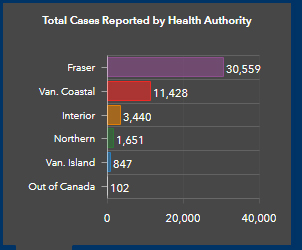
Thursday December 24, 2020 | VICTORIA, BC [Updated December 28, 2020 with Island Health regional insert]
by Mary P Brooke, B.Sc., editor | Island Social Trends
All year the degree of infection and rate of transmission of the COVID-19 virus on Vancouver Island has been low and well-contained compared to the rest of BC.
Many islanders have speculated this year as to the reasons for this (including lower population density, some degree of separation for being on an island, and a higher degree of pro-active lifestyle compliance).
For now, here are the BC Centre for Disease Control stats for COVID within the Island Health authority as of December 23:
- New cases: 9
- Active cases Dec 23: 66
- Total cases in 2020: 847
- People presently in hospital: 5 (one in ICU)
- Total hospitalizations all year: 50
- Total tests all year: 153,562
- Total recovered (previously test-positive): 766
- Total deaths all year: 11
Year to date, the highest number of cases and deaths have been in Fraser Health, followed by Vancouver Coastal, Interior, North and then Island Health.
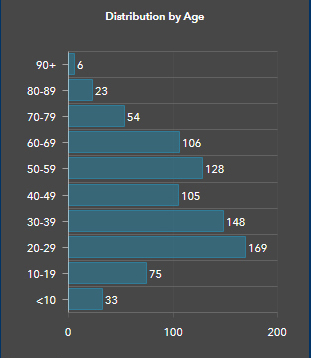
The ‘out of Canada’ category is mostly comprised of people who come to Canada as temporary foreign workers.
On Vancouver Island there have been 21 schools with COVID-19 exposure in November and December. That is the lowest of all health regions (Fraser 288, Vancouver Coastal 117, Interior 55, Northern 45).
There have been 857 cases of COVID-19 in Island Health since the start of the pandemic. The distribution of those cases has been 287 south, 382 central, and 188 north.
Of the 65 active cases at December 24 on Vancouver Island, 30 are in the south, 22 central and 13 in the northern area of the island.
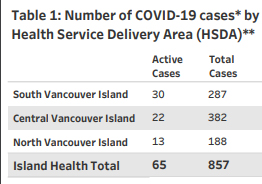
Helping out around BC:
Earlier this week, Island Health’s Chief Medical Health Officer, Dr Richard Stanwick, says he has loaned out some top personnel to other health jurisdictions to help out with the load in other regions of the province.
Meanwhile yesterday Provincial Health Officer Dr Bonnie Henry said hospitalizations across BC are “at their highest all year”. Most of that is in Fraser Health as well as in Vancouver Coastal Health.
Curve has flattened somewhat:
Dr Henry said during her latest COVID-19 data-modelling presentation (December 23) that the COVID-19 epidemiological curve in BC has flattened somewhat following a peak in mid-November.
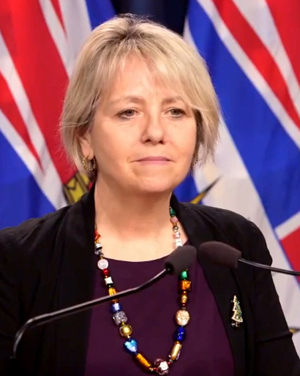
The stated incubation period of the COVID-19 virus is up to 14 days. The mid-November case peak would have been a result of socialization about two weeks earlier (i.e. Halloween). High results for cases at the end of November and in early December would have been a result of socialization around Remembrance Day (November 11) and getting out for holiday shopping or visiting.
Currently the transmission rate of COVID-19 in BC is about 40 to 50 per cent of normal, said Dr Henry. That will help keep spread low and minimize exposure in schools and long-term care, she explained.
Vaccination progress:
The first available vaccine against COVID-19 (a mRNA product by Pfizer-BioNTech out of Germany) was administered to long-term care and frontline health-care professionals last week in Fraser and Vancouver Coastal health. This week it was Island Health’s turn – including a high-profile inoculation injection for Dr Henry and Dr Stanwick as a show of confidence in the product and process.
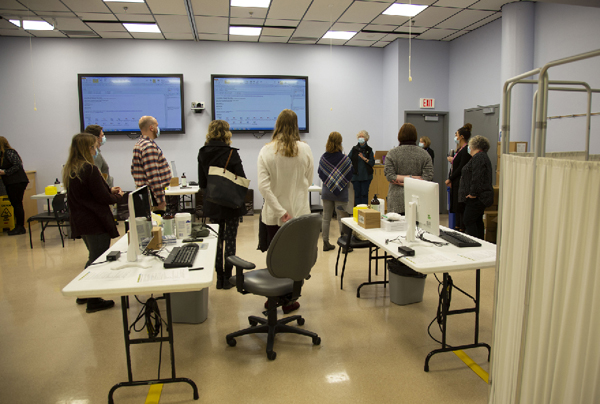
In BC the second (booster) dose of the Pfizer vaccine will be given at day 35, says Dr Henry (extending that past the usual 28 days). This is part of a strategy to make sure as many people as possible get their first dose.
A similar mRNA vaccine product — by Moderna (out of the USA) — has been approved for use in Canada, as announced today in Ottawa. It will be easier to transport to rural and remote areas, primarily due to less strident temperature requirements. Dr Henry says the first focus for that product in BC will be Indigenous communities and residents of long-term care.




